#EMR and EHR software
Explore tagged Tumblr posts
Text
The world of healthcare is continually evolving, with mental and behavioral health practices leveraging technology to manage critical patient data more efficiently. In today’s digital age, Electronic Health Records (EHR) and Electronic Medical Records (EMR) are becoming increasingly popular in healthcare management. Understanding the key differences between EMR and EHR software, as well as their benefits and importance, can aid healthcare professionals in making an informed decision when selecting the most suitable system for their requirements. Learn more - https://worldbizmag.com/ehr-vs-emr-the-differences-advantages-and-importance-of-each/
0 notes
Text
EMR/EHR - Electronic Health Records Software - CureMD

Transform your practice with CureMD's cloud-based Electronic Health Record in a way you never imagined before. With a powerful knowledge base, CureMD medical recording software is built for usability, performance, and reliability. It delivers advanced features, previously available in systems costing thousands of dollars, at a fraction of the cost.
Specialty-Focused EHR
Our specialty-focused CureMD solution gives you point-and-click selection, customization tools and much more to support your unique practice style, preferences and workflow. Let's explore what type of EHR customization we offer for different specialties.
EHR for Oncology EHR for Cardiology EHR for Dermatology EHR for Endocrinology EHR for Gastroenterology EHR for Nephrology EHR for Neurology EHR for Allergy Immunology EHR for Otolaryngology EHR for Ophthalmology EHR for Rheumatology and EHR for Urology
With CureMD software for medical records, you don't spend thousands of dollars on set up, maintenance and licensing fees, and you don't pay for workflow-driven customization or dedicated support. Learn more about CureMD EHR, visit official website: https://www.curemd.com/
1 note
·
View note
Text
EHR Trends That Will Dominate In Future

Thanks to the break-neck pace at which technology continues to advance, the world of healthcare is changing all around us. People think that advancements really only occur in terms of the medicine and other resources that are available to the public.
In reality, technology is transforming the way the practices themselves operate – opening the door for things to become more efficient, more effective, and more proactive. That is to say nothing of how important it is for practices to adopt these new tech trends to stay as competitive as possible as well.
All told, 2025 is expected to be a pivotal year for healthcare technology adoption. The global healthcare IT market is expected to hit an enormous $974.5 billion in value by as soon as 2027 – with a CAGR of 19.8% every year between now and then. This is true for a wide range of different reasons, all of which are worth a closer look.
According to one recent study, about 78% of office-based physicians and a massive 96% of non-federal acute care hospitals had developed some type of certified EHR by 2021. To put that into perspective, those numbers were 28% and 34% just ten short years ago.
Read More: https://prognocis.com/ehr-top-trends/
#ehr software trends#ehr software#best emr software#electronic health records software#electronic health record solutions
0 notes
Text
#Cellma#riomed#healthcare#wellness#health#ehr software#epr software#emr software#HIS#HIMS#Hospital software#patient records#patient care#patient portal
0 notes
Text
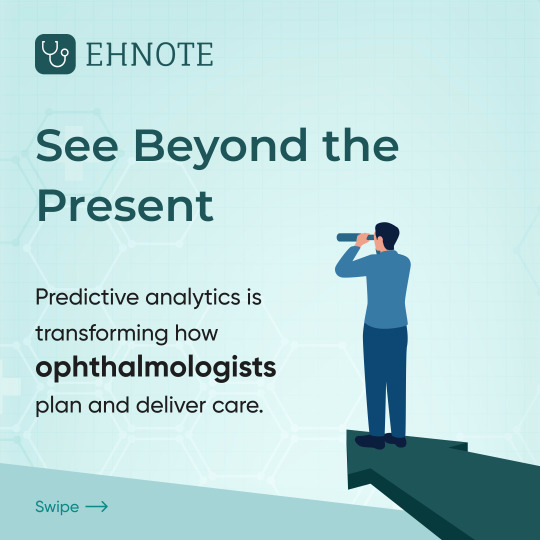
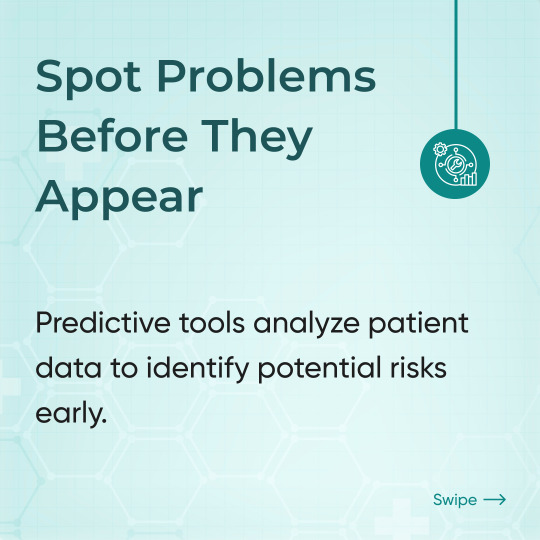
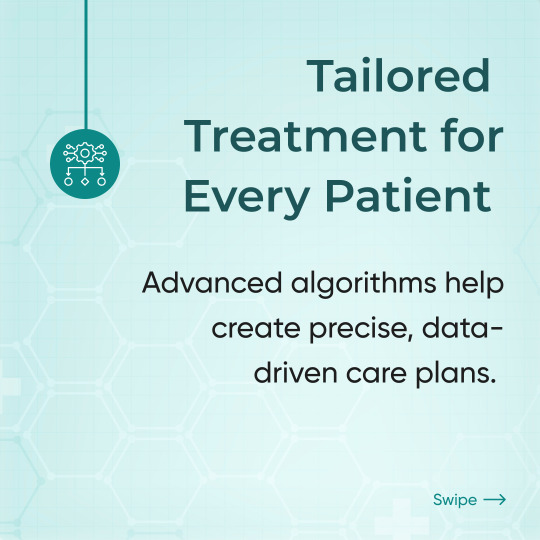

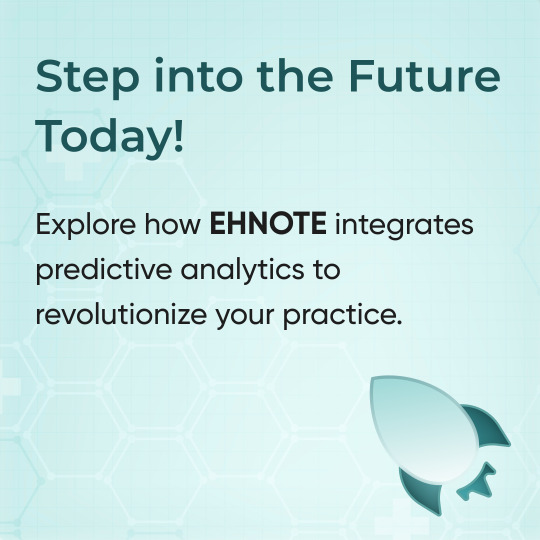
Discover how predictive Analytics are changing the care delivery processes in eye care. EHNOTE empowers you with new generation technologies to leverage predictive analytics for improving your care delivery process and make accurate decisions faster. Get in touch today!:
eyecare #ophthalmologists #ophthalmology #eyedoctor #optometrist #optometry #optician #doctors #eyesurgeon #eyedoctor #cataract #ophthalmologyehr #ophthalmologyemr #cataractsurge
#healthcare#ophthalmology#emr software#ehr software#ophthalmology ehr software#ophthalmology emr software#ophthalmologist
0 notes
Text
Save Time and Enhance Care with NiftyHMS Prescreening
Patient prescreening helps clinics save time and focus on care. By using NiftyHMS, patients can share their symptoms and medical history online before visiting the clinic, making appointments faster and more efficient.
Key Features:
Self-Service Portal: Patients describe symptoms online.
Medical History Capture: Collects patient records in advance.
Customizable Templates: Fits your clinic’s specific needs.
Save Time at the Clinic: Reduces waiting and paperwork for OPD visits.
NiftyHMS simplifies healthcare with easy-to-use tools for clinics and patients.
Read More: https://niftyhms.com/blog/do-electronic-medical-records-improve-quality-of-care/
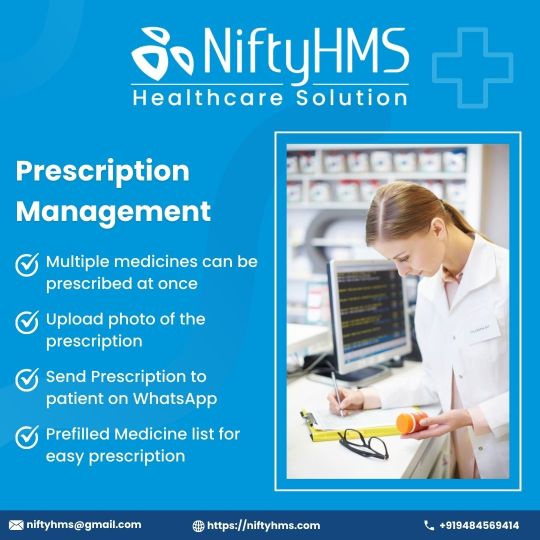
#ehr software#Electronic Health Records#Electronic Medical Record Systems#Electronic medical records#EMR software#EMR/EHR Implementation#Health IT Solutions#Medical Practice Management Software#Medical Record Software#Patient Record Management#Medical records management#Medical tourism in India#Medical travel to India#Online doctor appointment on WhatsApp#OPD management solutions#Patient monitoring#Queue management system#Reducing hospital wait times#Remote patient monitoring with AI#Siddha treatments in Kerala#Top medical tourism destinations#Virtual consultations for patients#WhatsApp appointment booking system#WhatsApp appointment scheduling#WhatsApp online appointment booking#World-class hospitals in India
0 notes
Text

Tired of juggling multiple systems and dealing with their high costs? Make the switch to IMS—your all-in-one solution for practice management and electronic health records (EHR). Streamline your workflows, reduce expenses, and improve patient care with our integrated platform. Discover the power of efficiency with IMS today and take your practice to the next level!
0 notes
Text
oeHealth All In One: Healthcare Management System on Odoo
oeHealth is an Odoo Healthcare Management System developed by Braincrew Apps. It supports all EMR and EHR functionalities and includes all the features that assist hospital management staff in reducing their workload and providing the best healthcare services to patients.
Explore Now: https://apps.odoo.com/apps/modules/17.0/oehealth_all_in_one
#Electronic Medical Records#EMR#Electronic Health Records#EHR#Odoo Hospital Management Software#Odoo HMS#Odoo Hospital Management System#Odoo HIMS#Odoo Healthcare Management System#Odoo Medical Practice Management System
0 notes
Text
Enhancing Healthcare Efficiency Through Seamless EHR Integration
In today’s healthcare landscape, efficient and interconnected systems are essential for delivering quality patient care. Electronic Health Record (EHR) integration serves as the backbone for achieving this goal, offering a unified platform that connects disparate healthcare systems and streamlines operations. The growing reliance on EHR integration services highlights the need for robust integration solutions that improve clinical workflows, data accessibility, and overall patient outcomes.
Bridging Disparate Systems
Healthcare providers often use various software applications for managing clinical, administrative, and operational tasks. EHR integration solutions acts as a bridge between these systems, enabling seamless communication and data exchange. Whether it’s linking laboratory systems, pharmacy management platforms, or billing software, integration ensures that vital patient information is accessible in real-time, reducing delays and errors in care delivery.
Driving Interoperability
Interoperability is a key challenge in modern healthcare, as data silos can hinder collaboration between providers. A well-executed EHR integration addresses this challenge by aligning systems to a common standard. This ensures that data flows smoothly across platforms, empowering healthcare professionals with the information they need to make informed decisions.
Integration also facilitates compliance with regulatory standards, such as the HL7 and FHIR frameworks, ensuring data accuracy and secure sharing across healthcare networks.
Enhancing Patient-Centered Care
At the heart of EHR integration is the goal of improving patient care. By consolidating patient data into a single source of truth, clinicians can access comprehensive medical histories, including test results, prescriptions, and treatment plans. This holistic view not only enhances diagnosis and treatment but also reduces the likelihood of duplicate tests and medication errors.
Additionally, integrated systems allow patients to engage more actively in their healthcare journey. Features like patient portals provide individuals with easy access to their records, fostering transparency and trust between patients and providers.
Improving Operational Efficiency
For healthcare organizations, streamlined workflows translate into cost savings and better resource allocation. EHR integration eliminates redundancies and automates routine processes such as appointment scheduling, claims processing, and report generation. By reducing administrative burdens, healthcare staff can dedicate more time to patient care, ultimately improving service quality.
The Road Ahead
As healthcare continues to evolve, EHR integration remains a cornerstone for achieving a connected and efficient ecosystem. By bridging gaps between systems, enhancing data accessibility, and fostering interoperability, it lays the foundation for a future where technology empowers better health outcomes and operational excellence. Embracing these solutions is not just a technological upgrade but a step towards transforming healthcare delivery.
#ehr integration software#ehr integration services#ehr integration api#ehr integration#ehr integration solutions#EMR/EHR INTEGRATION#CUSTOM EHR INTEGRATION SOLUTIONS#ehr data integration
0 notes
Text
Transforming Care with FQHC EHR Software: Key Features and Benefits

Federally Qualified Health Centers (FQHCs) play a vital role in delivering healthcare services to underserved populations. With their unique mission of addressing health disparities, these centers face challenges like managing complex reporting requirements, providing integrated care, and ensuring financial sustainability. The adoption of robust FQHC EHR (Electronic Health Record) software has proven to be a game-changer, enabling them to streamline operations, enhance patient care, and meet regulatory demands effectively. This article explores the significance of EHR systems for FQHCs, the essential features to consider, and the top solutions in the market.
Understanding the Role of EHR in FQHCs
FQHCs are required to meet stringent standards for patient care, data reporting, and reimbursement processes. Unlike traditional healthcare facilities, these centers often provide a wide range of services, including primary care, dental care, behavioral health, and pharmacy services, under one roof. Managing this diversity requires an EHR solution tailored to their needs.
FQHC EHR software addresses the following challenges:
Regulatory Compliance: Ensures accurate and timely Uniform Data System (UDS) reporting as mandated by HRSA (Health Resources and Services Administration).
Care Coordination: Facilitates seamless communication and data sharing across multidisciplinary teams.
Sliding Fee Scales: Automates the financial management of income-based billing models.
Population Health Management: Supports tracking and addressing social determinants of health to improve community health outcomes.
Interoperability: Enables integration with external providers, public health agencies, and state registries for better care continuity.
Essential Features of FQHC EHR Software
To meet the unique requirements of FQHCs, an EHR solution must include the following features:
1. Integrated Multi-Specialty Modules
FQHCs offer diverse services, so their EHR must support the needs of primary care, behavioral health, dental care, and pharmacy services. Integration of these modules ensures that all departments can work seamlessly without duplicating efforts.
2. Sliding Fee Scale Management
Given that many FQHC patients qualify for care based on income, the EHR must include tools to automate billing and manage sliding fee schedules efficiently.
3. Advanced Reporting Tools
Compliance with UDS and other federal reporting requirements is a priority for FQHCs. EHR systems should offer customizable reporting templates to streamline data submission.
4. Telehealth Integration
As telemedicine becomes a standard mode of care delivery, EHRs must provide telehealth capabilities to reach patients in remote or underserved areas.
5. Population Health Analytics
FQHCs are responsible for improving the health of entire communities. Advanced analytics tools help track chronic disease trends, identify care gaps, and develop intervention strategies.
6. Interoperability and Data Sharing
An effective EHR must adhere to interoperability standards like HL7 and FHIR, enabling seamless data exchange with external systems and registries.
7. User-Friendly Interface
Staff at FQHCs often wear multiple hats, from clinical care to administrative duties. A user-friendly interface ensures quick adoption and efficient workflows.
Top EHR Solutions for FQHCs
1. BlueBriX’s BlueEHR
BlueEHR is a highly customizable EHR platform designed specifically for FQHCs and other healthcare organizations with unique workflows. Its flexibility allows centers to tailor the system to meet their specific needs, whether managing sliding fee scales, supporting behavioral health, or handling multi-specialty care.
Key Features:
Customization: Adaptable modules to match FQHC workflows.
Population Health Management: Advanced analytics for tracking patient outcomes.
Interoperability: Seamless integration with external providers and agencies.
Cost-Effectiveness: Affordable pricing model suitable for FQHC budgets.
BlueEHR stands out for its focus on empowering healthcare providers with tools to improve patient outcomes and operational efficiency.
2. NextGen Healthcare
NextGen offers a comprehensive EHR system tailored to the needs of FQHCs. It excels in managing multi-specialty care and meeting compliance requirements.
Key Features:
Integrated dental, behavioral health, and primary care modules.
Customizable reporting for UDS and other regulatory requirements.
Sliding fee scale support.
3. Athenahealth
Athenahealth provides a cloud-based EHR platform with a focus on improving care delivery and administrative efficiency. Its telehealth integration and patient engagement tools make it a strong contender for FQHCs.
Key Features:
Real-time reporting tools for compliance.
Population health analytics.
Telehealth capabilities for remote patient care.
4. Epic Community Connect
Epic offers a scaled-down version of its enterprise-level EHR for smaller organizations like FQHCs. Its robust features include patient engagement tools, predictive analytics, and interoperability.
Key Features:
Cost-effective access to Epic’s tools.
Integration with state immunization registries.
Advanced data analytics.
5. eClinicalWorks
Known for its affordability and comprehensive features, eClinicalWorks is a popular choice for FQHCs. It supports value-based care initiatives and provides robust telehealth integration.
Key Features:
User-friendly interface for quick adoption.
Care coordination tools for multi-specialty practices.
Population health management.
Benefits of Adopting FQHC EHR Software
Investing in the right EHR system delivers significant benefits to FQHCs, including:
Improved Patient Care EHRs streamline documentation and data sharing, enabling providers to focus on patient care rather than administrative tasks.
Enhanced Reporting Accuracy Automated reporting tools reduce errors and ensure compliance with federal and state regulations.
Financial Sustainability Features like sliding fee scale management and integrated billing help FQHCs optimize reimbursements and reduce revenue leakage.
Better Care Coordination Integrated modules and interoperability ensure that all care teams have access to the same patient data, reducing redundancies and improving outcomes.
Increased Patient Engagement Telehealth platforms, patient portals, and mobile apps make it easier for patients to access care and stay connected with their providers.
Challenges in Implementing FQHC EHR Systems
Despite their benefits, implementing an EHR system in an FQHC setting can be challenging. Common barriers include:
Cost Constraints: FQHCs often operate on limited budgets, making affordability a key consideration.
Staff Training: Ensuring that all staff members are proficient in using the EHR system requires time and resources.
Data Migration: Transitioning from legacy systems to a new EHR can be complex and time-consuming.
Future Trends in FQHC EHR Software
The future of FQHC EHR systems lies in innovation and adaptability. Emerging trends include:
AI and Machine Learning: Automating tasks like coding, documentation, and analytics.
Social Determinants of Health Integration: Enhancing population health tools to address community-level health disparities.
Advanced Telehealth Features: Incorporating virtual reality, remote monitoring, and AI-driven diagnostics.
Blockchain for Security: Strengthening data security and patient privacy.
Conclusion
FQHC EHR software is more than a tool—it’s a strategic asset that enables Federally Qualified Health Centers to deliver high-quality, efficient, and patient-centered care. Solutions like BlueEHR, with their customizable and cost-effective features, are paving the way for FQHCs to overcome operational challenges and focus on their mission of serving vulnerable populations. By investing in the right EHR system, FQHCs can enhance care coordination, meet regulatory requirements, and achieve better health outcomes for their communities.
0 notes
Text
How Are EHR Software Solutions Transforming Modern Healthcare?
EMR systems and EHR systems play a pivotal role in streamlining healthcare operations by digitizing patient records and providing real-time access to medical data.
How Do EMR and EHR Systems Enhance Healthcare Delivery?
These systems improve patient care by enabling healthcare providers to track patient history, medication, and diagnostics seamlessly. By integrating with other healthcare tools, EMR systems reduce paperwork and administrative burden, allowing physicians to focus more on patient care.

EHR systems, on the other hand, go beyond capturing patient data by facilitating interoperability across healthcare organizations. These systems ensure seamless communication between providers, enhancing care coordination and improving patient outcomes.
What Makes Custom EHR Software Solutions Essential for Modern Healthcare?
Custom EHR software solutions are tailored to meet the unique needs of healthcare providers, offering flexibility and functionality beyond standard systems. They allow organizations to integrate specific workflows and features, ensuring a more efficient and personalized user experience.
Enhanced Workflow Integration: Custom EHR software solutions adapt to the workflows of different healthcare facilities, ensuring smooth operation.
Scalability: These solutions can be scaled to match the growth of the organization, making them a future-ready choice for healthcare providers.
Improved Data Security: Customization allows for enhanced security features, ensuring compliance with healthcare regulations like HIPAA.
How Do EHR Software Solutions Support Better Decision-Making?
EHR software solutions provide healthcare providers with real-time access to patient data, empowering them to make informed decisions. The availability of comprehensive patient records helps in identifying patterns, monitoring chronic conditions, and predicting potential health risks.
Additionally, EHR software solutions integrate advanced analytics tools, enabling providers to evaluate treatment outcomes and improve care quality. These insights are essential for preventive care and long-term healthcare planning.
What Are the Benefits of EMR and EHR Systems in Healthcare?
The adoption of EMR systems and EHR systems brings numerous advantages to healthcare organizations:
Improved Patient Care: These systems provide accurate and updated patient information, leading to better diagnoses and treatment.
Operational Efficiency: By automating administrative tasks, they reduce the workload on healthcare staff.
Cost Reduction: Eliminating paper records and streamlining processes can lead to significant cost savings.
Regulatory Compliance: EMR and EHR systems ensure adherence to healthcare laws and standards, reducing legal risks.
Why Are EHR Software Solutions Vital for Interoperability?
EHR software solutions are designed to promote interoperability across various healthcare settings. They enable seamless data exchange between hospitals, clinics, laboratories, and other healthcare providers. This connectivity ensures that patients receive coordinated and consistent care, regardless of where they seek treatment.
Custom EHR software solutions further enhance interoperability by allowing integration with third-party tools and legacy systems. This ensures healthcare providers can deliver efficient, patient-centric care without disruptions.
Conclusion:
EMR systems, EHR systems, and custom EHR software solutions are revolutionizing healthcare by improving efficiency, patient care, and data management. Their role in fostering interoperability and supporting informed decision-making makes them indispensable in modern healthcare.
0 notes
Text
youtube
Effortless OT Scheduling with TatvaPractice
Effortless OT scheduling with TatvaPractice streamlines the process for healthcare facilities. Users simply log in and access the dedicated OT scheduling feature. Here, they input details such as surgeon availability, procedure types, and patient information. The intuitive interface allows for easy navigation and customization of schedules based on priority and resource availability. Automatic notifications ensure all stakeholders stay informed of schedule changes. TatvaPractice also offers features for managing equipment and staff allocations, optimizing efficiency. With real-time updates and seamless integration with other modules, such as patient records and billing, TatvaPractice simplifies OT scheduling, reducing administrative burden and minimizing errors. This efficient solution enhances operational effectiveness, allowing healthcare providers to focus more on delivering quality patient care. https://www.tatvacare.in/tatvapractice/
0 notes
Text
#healthcare#Cellma#riomed#diabetes#emr software#ehr software#HIS#HIS solution#HIMS#HIMS solution#patient records#patient portal#patient care#patient management#epr software#wellness#health#healthcare IT#healthcare innovation
0 notes
Text





ophthalmology emr software | Ophthalmology
1 note
·
View note
Text
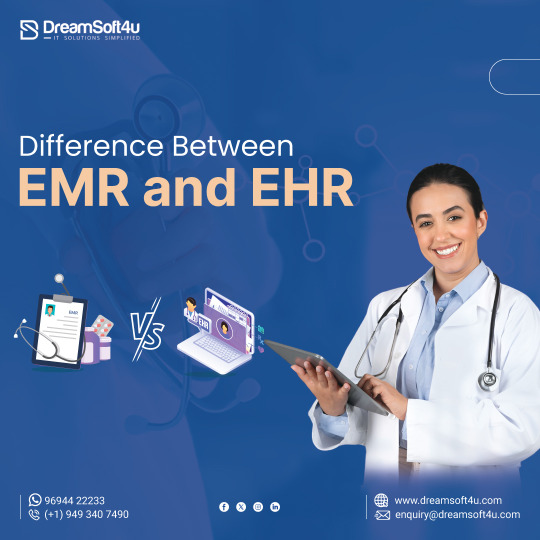
The healthcare industry has adopted technology widely and taken steps towards digital transformation. However, in order to make a complete digital shift, healthcare needs to streamline their data management. Although healthcare is one of the biggest sectors with huge amounts of data. It has to be secured and easily accessible. This is where two technological advancements, i.e., EMR vs EHR, play major roles.
#ehr software#emr software#emr system#emr vs ehr#ehr integration#benefits of ehr#emr integration#ehr benefits#benefits of emr#emr benefits
0 notes